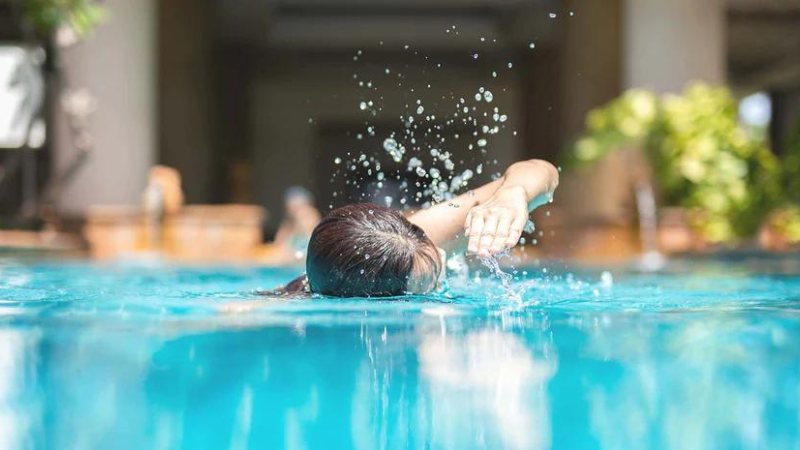Best Hair Care Tips For Swimmers – Diving into the refreshing pool waters often comes with the downside of chlorine-induced hair damage. For swimmers seeking to maintain luscious locks, understanding effective hair care strategies is essential.
Chlorine can strip hair of its natural oils, leaving it dry, brittle, and prone to discoloration. In this guide, we’ll unveil a series of expert-recommended tips tailored to swimmers.
From pre-swim preparations to post-pool rituals, discover how to shield your hair from chlorine’s harmful effects.
Explore nourishing treatments, protective products, and mindful practices that will help you enjoy the pool while keeping your hair healthy and vibrant.
Embrace these tried-and-true methods to combat chlorine damage and ensure your hair stays as radiant as your time spent in the water.
How does chlorine affect your hair?
Chlorinated water can have adverse effects on your hair, such as making it dry and susceptible to breakage. While ordinary tap water does contain chlorine, the levels are typically low and not a significant concern during routine showers. However, the elevated concentration of chlorine used in pools can be particularly damaging to your hair and skin, especially with frequent exposure.
Here’s how this happens:
- Dryness and Weakness: Chlorine in pool water can strip your hair of its natural oils and proteins, causing it to become dry and fragile. This dryness can lead to hair breakage and a lackluster appearance.
- Chlorine Exposure: Pools are treated with higher levels of chlorine to maintain water quality, making the exposure more intense. Chlorine can also affect your skin, leading to dryness and potential irritation.
To protect your hair and skin when swimming, consider wearing a swim cap or wetting your hair with non-chlorinated water before taking a dip. Afterward, rinse your hair thoroughly with fresh water to remove chlorine, and use deep-conditioning treatments to restore lost moisture. This way, you can enjoy pool time without compromising the health and appearance of your hair and skin.
Major Affects of chlorine on your hair
Swimming pool chlorine serves a vital role in sanitizing the water, but for those who swim frequently, it can wreak havoc on their otherwise healthy hair. Chlorine is notorious for depleting the natural oils, known as sebum, that your body produces to safeguard your hair. Its effects go beyond just hair, causing skin and scalp irritation, and it’s particularly harsh on your hair, leading to various issues:
- Hair cracking and splitting.
- Stripping your hair of its essential moisture.
- Altering the color of your natural hair or dyed hair.
- Weakening your hair, often culminating in split ends.
The extent of damage isn’t always noticeable for occasional swimmers; a once-a-year holiday swim typically won’t have a significant impact on hair health. However, the frequency of your swims is less relevant than your specific hair type, as some are more vulnerable to chlorine’s effects. These include individuals with:
- Thin or fine hair
- Color-treated hair
- Bleached hair
- Chemically treated hair
- Dry hair
- Hair already suffering from damage
Whether you’re a regular swimmer or a daily enthusiast, safeguarding your hair from chlorine damage is imperative, regardless of your natural hair color or type.
Also, Read – Low-Maintenance Hairstyles For Busy Lifestyles
Best Hair Care Tips For Swimmers To Combat Chlorine Damage
Here are the 10 Best Hair Care Tips For Swimmers to combat chlorine damage:
1. Pre-Wet Hair
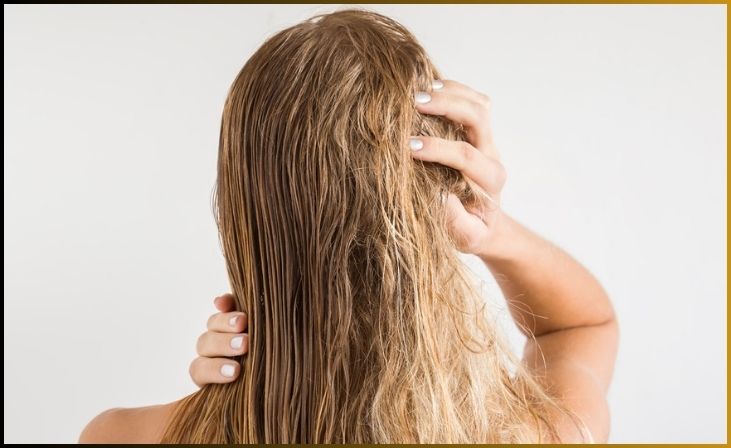
Before taking a plunge in the pool, it’s a wise practice to drench your hair completely with clean, non-chlorinated water. This simple but effective step serves a crucial purpose: it saturates the hair shaft with fresh water, minimizing the absorption of chlorinated pool water. By ensuring that your hair is already full of clean water, it has less capacity to soak up the chlorine-laden pool water. This can significantly reduce the potential damage caused by chlorine, such as dryness and brittleness. It’s a quick and easy way to create a protective barrier for your hair, preserving its health and shine, especially for those who swim regularly.
2. Apply a Protective Product
To fortify your hair’s defense against chlorine, consider applying a protective layer before swimming. Options like leave-in conditioner, pre-swim Herbal Swimmer’s Hair Oil, or a specialized hair serum serve as effective barriers.
Eco-friendly pre-swim Herbal Swimmer’s Hair Oil
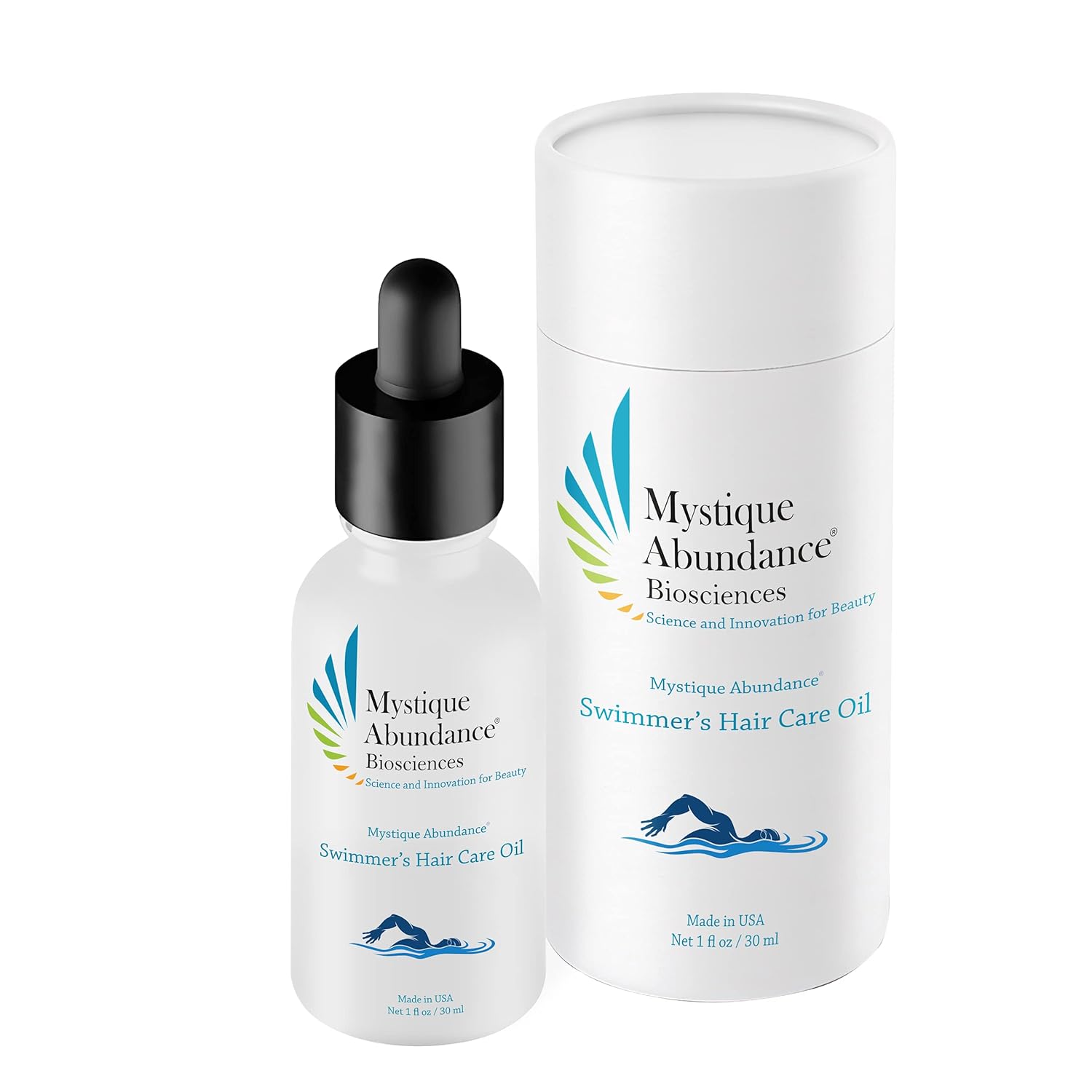
- Product Benefits: Damage Control
- Hair Type: All
- Material Type Free: Paraben Free
- Scent: Sandalwood, Lavender, Peppermint
- Liquid Volume: 30 Milliliters
These products form a protective shield, reducing the absorption of chlorine into your hair shaft. Additionally, they offer the bonus of extra hydration, which can counteract the drying effects of chlorine. Applying one of these treatments evenly through your hair before taking a dip is a simple yet powerful preventative measure, especially for frequent swimmers. It not only safeguards your hair’s health but also ensures it remains hydrated and lustrous even after exposure to chlorinated water.
3. Wear a Swim Cap
Wearing a swim cap, preferably crafted from silicone or latex, is a reliable safeguard against chlorine exposure. These caps function as a formidable protective barrier, creating a shield between your hair and the chlorinated pool water. This layer effectively reduces the amount of chlorine your hair absorbs, thereby minimizing potential damage.
CybGene Silicone Swim Cap
- Size: Large (Suggest>10 years)
- Color: Mint Green
- Material: Other
- Brand: CybGene
- Target Audience: Women, Men
Swim caps come in various styles and sizes, ensuring a snug fit for swimmers of all ages. By consistently donning a swim cap, you can maintain the health and integrity of your hair, especially if you’re a regular swimmer. It’s a simple yet highly effective practice that offers both protection and peace of mind.
4. Rinse Immediately
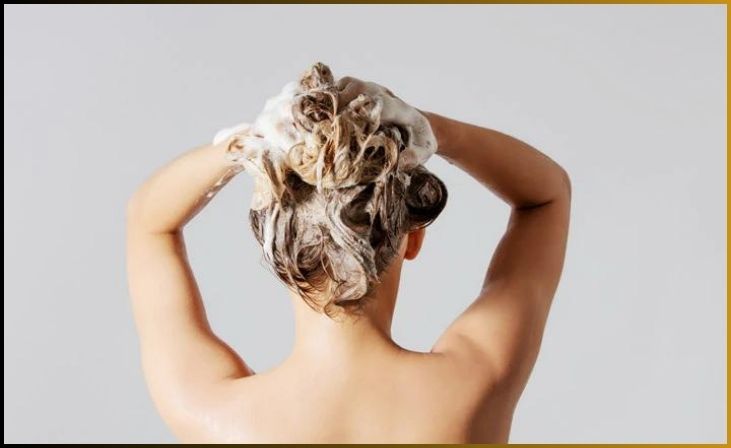
Once you’ve finished your swim, it’s crucial to promptly rinse your hair with fresh, clean water. This swift action serves a vital purpose: it aids in the removal of any residual chlorine. Rinsing your hair immediately helps prevent chlorine from lingering and causing additional damage. The longer chlorine stays in your hair, the more opportunity it has to strip away natural oils and moisture, leading to dryness and brittleness. By rinsing right after your swim, you minimize these risks and promote the overall health of your hair. It’s a simple yet effective post-swim ritual that can make a significant difference, especially for individuals who swim frequently.
5. Use a Clarifying Shampoo
UltraSwim Dynamic Duo Repair Shampoo and Conditioner
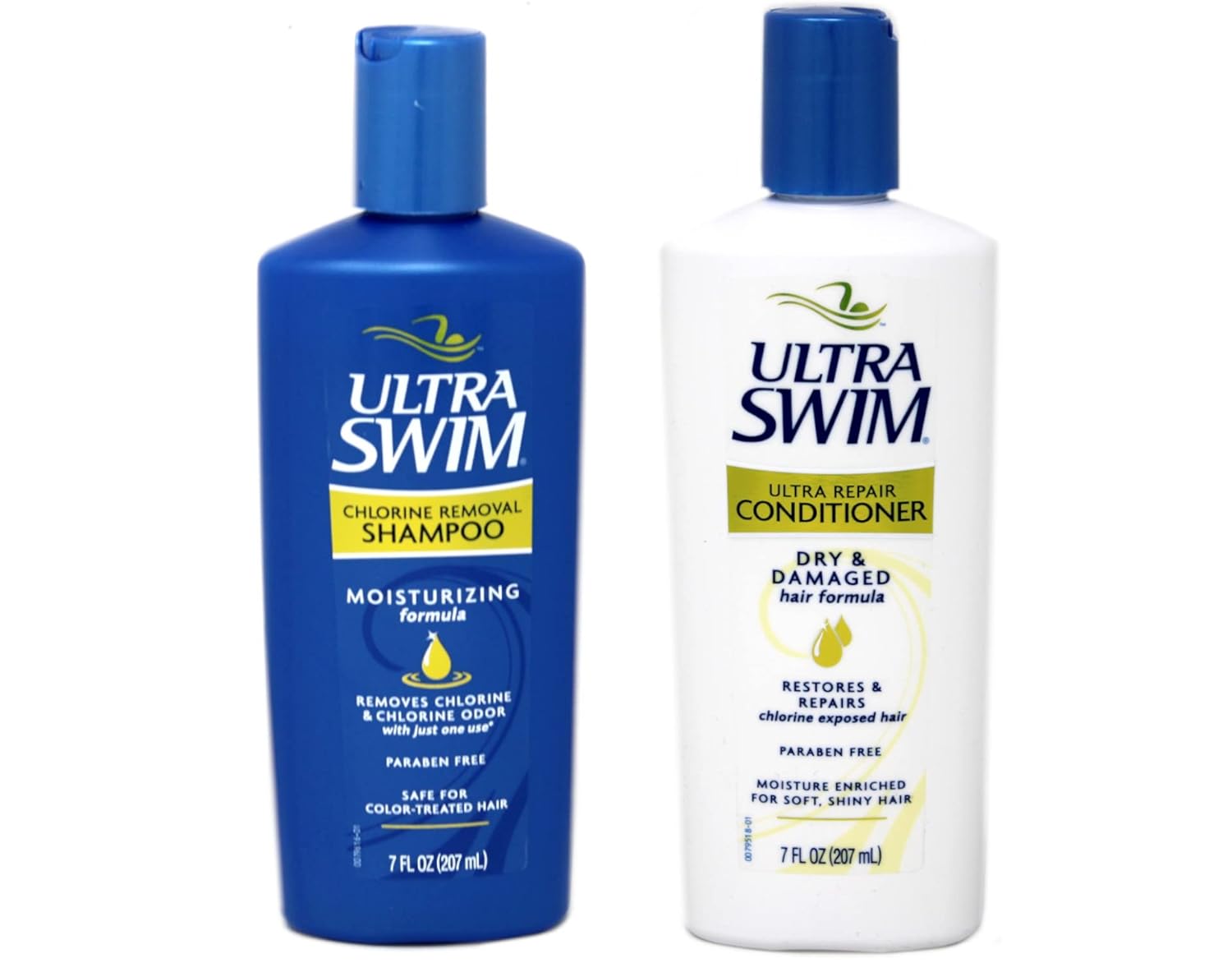
- tem Form: Cream
- Brand: UltraSwim
- Hair Type: Dry
- Number of Items: 1
- Unit Count: 1 Count
To maintain the health of your hair, consider using a clarifying shampoo once or twice a week. These shampoos are designed to deeply cleanse and remove chlorine buildup, ensuring your hair remains free from lingering pool chemicals. After using the clarifying shampoo, it’s essential to follow up with a hydrating conditioner. This step helps to restore lost moisture and maintain your hair’s natural balance.
The combination of clarifying and hydrating products not only eliminates the potential damage caused by chlorine but also ensures that your hair remains soft, shiny, and resilient. This regular maintenance routine is especially beneficial for those who are frequently exposed to chlorinated water, ensuring that your hair remains vibrant and healthy.
Also, Read – How To Prevent Hair Breakage And Split Ends
6. Deep Conditioning Treatments
To revitalize and repair your hair, consider making deep conditioning treatments a regular part of your hair care routine. These treatments play a crucial role in replenishing lost moisture and restoring any damage caused by factors like chlorine exposure. Look for products enriched with beneficial ingredients such as Paraben and Gluten Free, Vegan, Color Safe.
AquaGuard Everyday Conditioner

- Brand: AQUA GUARD
- Item Form: Liquid
- Material Feature: Vegan
- Hair Type: All
- Product Benefits: Damage Control
These components are known for their exceptional hydrating and reparative properties, helping to strengthen your hair and maintain its health. Regular deep conditioning treatments, when done at least once a week, can effectively combat the dryness and brittleness that may result from exposure to chlorinated water. It’s a nourishing practice that ensures your hair remains resilient, shiny, and full of life.
7. Protective Hairstyles
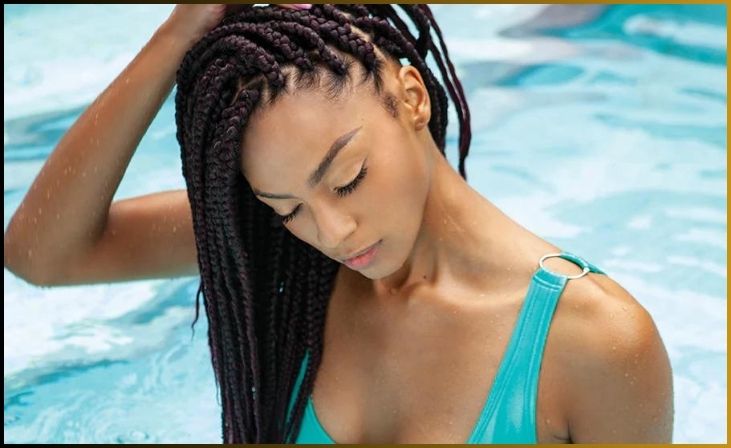
Opting for protective hairstyles, such as braids, buns, or ponytails, when swimming is a proactive approach to safeguard your hair. These hairstyles limit your hair’s exposure to chlorine-laden water, minimizing its contact with the damaging chemical. Additionally, they help prevent tangling, which is a common issue when hair comes in contact with pool water. Protective styles create a barrier between your hair and the pool, reducing the risk of chlorine absorption and tangling. This practice is particularly beneficial for individuals who swim frequently, ensuring that their hair remains both protected and manageable. It’s a simple yet effective way to maintain hair health and appearance in and out of the pool.
8. Limit Sun Exposure
Chlorine-damaged hair is susceptible to further harm from sun exposure. To shield your hair from harmful UV rays, consider wearing a wide-brimmed hat when outdoors. This not only provides a physical barrier but also offers shade, reducing UV damage. Additionally, using UV-protective hair products is a smart choice.
AquaGuard Pre-Swim Hair Defense
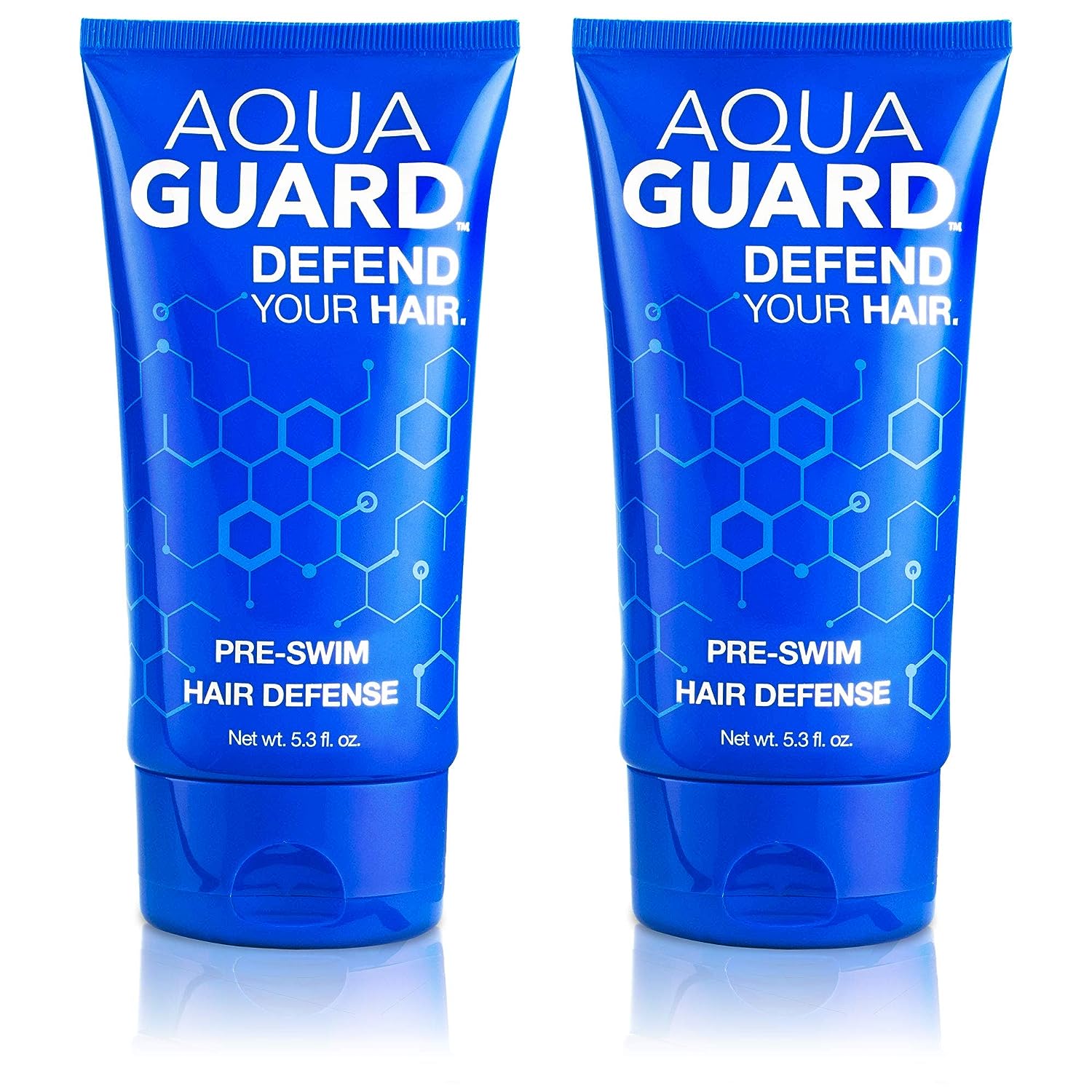
- Product Benefits: Protection from Pool Chemicals
- Hair Type: All
- Material Type Free: Gluten Free
- Scent: Almond
- Liquid Volume: 10.6 Fluid Ounces
These products contain ingredients designed to block or absorb UV radiation, preventing it from causing additional damage to your hair. The combined use of protective accessories and products ensures that chlorine-damaged hair is safeguarded from the sun’s harmful effects, promoting the overall health and appearance of your hair, especially during sunny outdoor activities.
9. Stay Hydrated

Staying well-hydrated is vital not only for your body but also for the health of your hair. Consuming an adequate amount of water plays a key role in maintaining your hair’s internal hydration levels. When your body is well-hydrated, it can better support your hair, making it more resilient against issues like chlorine-induced dryness. Dehydration can exacerbate the effects of chlorine, potentially leading to brittle and lackluster hair. By drinking plenty of water, you’re providing your hair with the hydration it needs to remain supple and vibrant. This internal moisture balance, coupled with external hair care, is a comprehensive approach to ensuring that your hair stays healthy and resilient, even when exposed to challenging conditions like chlorine.
10. Balanced Diet

Incorporating a diet rich in essential nutrients can significantly contribute to maintaining healthy hair and mitigating damage from within. Vitamins like A, C, and E, along with biotin, are particularly beneficial for promoting robust hair growth and combating issues such as chlorine-induced damage. Here’s how these nutrients play a role:
- Vitamin A: This vitamin aids in the production of sebum, a natural hair conditioner, which can counteract the dryness caused by chlorine exposure.
- Vitamin C: Known for its antioxidant properties, vitamin C helps to repair and protect hair from free radical damage, maintaining its strength and shine.
- Vitamin E: Vitamin E contributes to improved blood circulation to the scalp, ensuring that hair follicles receive essential nutrients for healthy growth.
- Biotin: Biotin, a B-vitamin, supports hair’s keratin infrastructure, leading to stronger and more resilient hair.
By including foods rich in these nutrients in your daily diet, such as fruits, vegetables, nuts, and lean proteins, you can fortify your hair from the inside out, helping it better withstand the challenges it may face, including chlorine exposure.
Quick Link: 10 Trendy Haircuts for Hispanic Hair
Importance Of Hair Care For Swimmers
Hair care for swimmers is of paramount importance due to the potential damage caused by prolonged exposure to chlorine and other pool chemicals.
Chlorine, although necessary for maintaining pool hygiene, can have adverse effects on hair health. Here’s why hair care is crucial for swimmers:
- Chlorine Damage: Chlorine strips the natural oils from hair, leading to dryness, brittleness, and an overall lack of luster. Over time, this damage can escalate, causing split ends and breakage.
- Discoloration: Chlorine can also cause hair to become discolored, turning lighter hair shades greenish due to chemical reactions. Proper hair care helps minimize such discoloration.
- Texture Alteration: Prolonged chlorine exposure can alter the texture of hair, making it rough and less manageable. This can make styling and upkeep challenging.
- Overall Appearance: Healthy hair contributes significantly to one’s overall appearance. Proper hair care ensures that swimmers can maintain their desired hair aesthetics, even with frequent exposure to pool water.
- Self-Confidence: Healthy hair boosts self-confidence. Swimmers who take care of their hair are likely to feel more confident both in and out of the pool.
- Long-Term Hair Health: Neglecting hair care in the face of chlorine exposure can lead to long-term damage that might require extensive treatments to rectify. Consistent hair care prevents such issues.
- Enjoyment of Swimming: By adopting effective hair care practices, swimmers can enjoy their time in the water without constantly worrying about the potential damage to their hair.
- Cost Savings: Preventing hair damage from chlorine can save swimmers money in the long run, as they won’t need to invest in costly treatments and products to rectify extensive damage.
In essence, maintaining proper hair care as a swimmer is essential for preserving hair health, appearance, and self-confidence, while also ensuring an enjoyable swimming experience without the worry of chlorine-related damage.
Conclusion (Best Hair Care Tips For Swimmers)
In the realm of swimming, where the allure of cool, chlorinated waters beckons, the significance of diligent hair care cannot be overstated.
The battle against chlorine damage is not only about preserving the aesthetics of your hair, but also about nurturing its health, strength, and vitality.
By embracing a holistic approach to hair care, swimmers can relish their aquatic pursuits while safeguarding the integrity of their precious locks.
From the initial step of pre-wetting your hair to the post-swim rituals of thorough rinsing and specialized shampoos, these practices act as armor against chlorine’s potential harm.
The shielding prowess of swim caps and protective hairstyles harmonizes with the rejuvenating effects of deep conditioning treatments and nutrient-rich diets.
Such measures amalgamate into a comprehensive strategy, fortifying your hair against the onslaught of chlorine.
FAQs
Chlorine strips the natural oils from hair, leaving it dry, brittle, and susceptible to breakage. Prolonged exposure can alter hair texture, cause discoloration, and weaken its overall health.
While a swim cap provides a protective barrier, it’s not a foolproof solution. It helps, but water can still seep in, and hair around the edges might still be exposed. Combining a cap with other protective measures is recommended.
Using a clarifying shampoo once or twice a week is generally sufficient. Overuse might strip your hair of essential oils, so find a balance that works for your hair type and chlorine exposure.
Opt for a deep conditioning treatment that’s rich in moisture-restoring ingredients like keratin, shea butter, and oils. Apply it to damp hair, focusing on the ends, and leave it on for the recommended time before rinsing.

